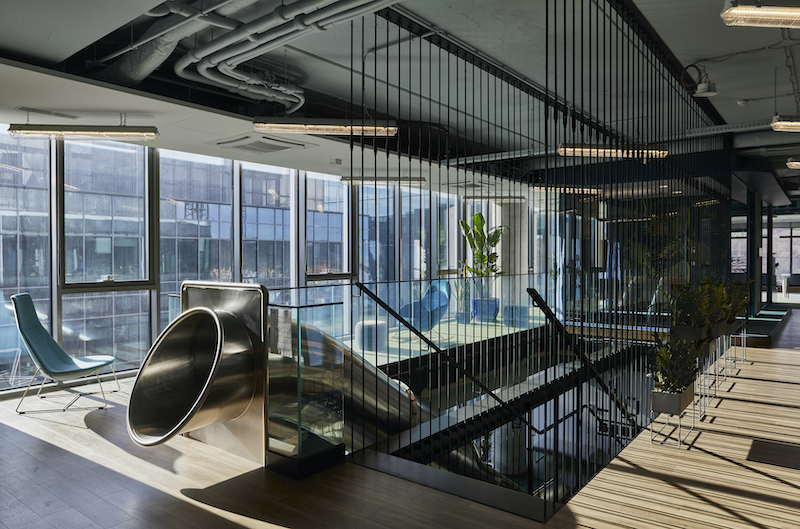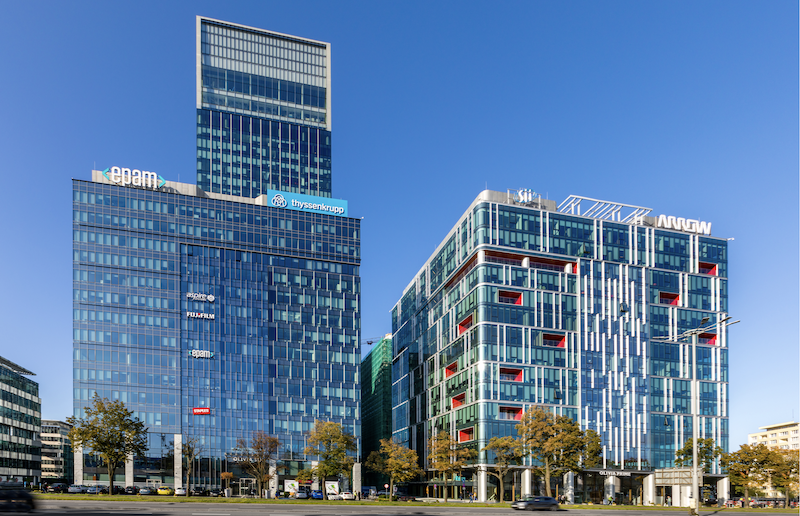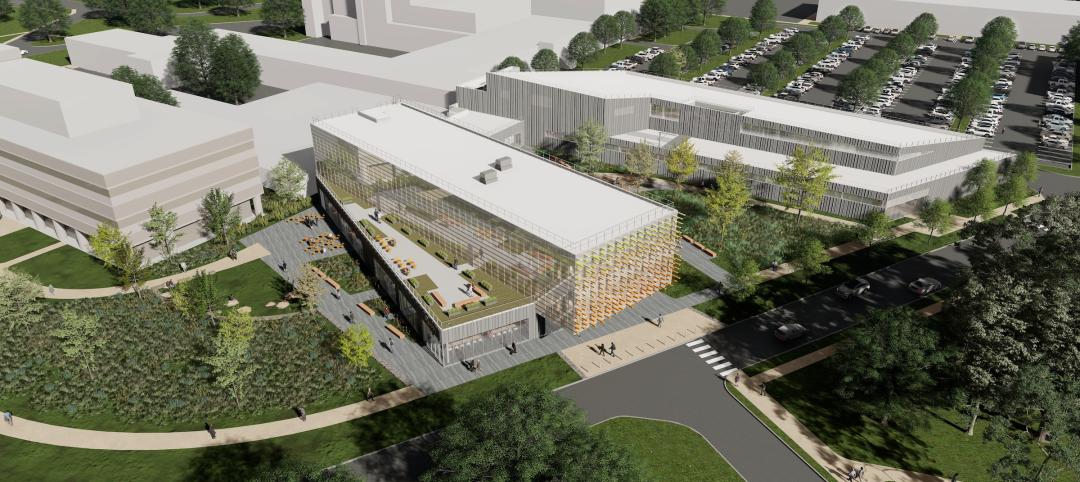The largest office complex in northern Poland is the first building to receive the highest WELL Health Safety Rating, as audited by the International WELL Building Institute (IWBI).
The Olivia Business Center, located in Gdansk, is the complex, with 230,000 sm (2.48 million sf) of office space within eight completed buildings. Olivia Building Center has been expanding since 2010. More than 8,500 people work at Olivia, whose tenants include Amazon, Bayer, PwC, and ThyssenKrupp.
The contractor for the construction of each building has been Pekabex, a leading precast concrete manufacturer. Konior and Partners developed the complex’s architectural concept, which has been continued by Gdynia-based BJK Architekci Studio. The complex’s primary investor is Maciej Grabski, cofounder of Wirtualna Polski (Virtual Poland), one of the country’s big media companies.
A LOCAL DOCTOR HELPS DEVISE SAFETY PROTOCOLS
A spokesperson for Olivia Business Center tells BD+C that the decision to make the buildings healthier stemmed from discussions, in February 2020, with Professor Krzysztof Korzeniewski, MD, Ph.D, the director of the Department of Epidemiology at a regional hospital. Korzeniewski assisted in developing procedures and planning to protect the buildings’ occupants from COVID-19.
The Olivia Business Center is one of the first complexes in the world to install ion air purification technology in its buildings. The devices saturate all internal areas with ventilated air that contains ions capable of destroying viruses, bacteria and other pathogens. The filters in the air handling units were raised to F7 from G4, and sensors for pollution and particulate matter were installed. The intensity of the air exchange in the buildings is controlled based on real-time CO2 measurements.
To maximize tenant safety, key-card sterilizers were installed, and elevator settings changed so that lift cabins stay open while in stay-by mode.
Elevators were among the common areas (including lobbies and access paths to parking lots) to which an active titanium coating was applied to ensure surfaces that are touched often are free from pathogenic organisms. The coating—developed by Lumichem and scientists at Jagiellonian University—eliminates bacteria, fungi, and viruses that come into contact with surfaces, and breaks down their residues into carbon dioxide and water.

Ventilation upgrades were among the improvements made to Olivia Business Center.
A PERFECT SCORE
To achieve its score of 25 out of 25 from IWBI (which launched its rating system last January), Olivia Business Center also made some structural changes to windows and façade in all of the buildings. Inside, occupants are directed by signage to walk in one direction to comply with social distancing guidelines. The frequency of the buildings’ cleaning regimen was increased. Cigarette sales are banned. And the building’s owner organizes free and open-to-everyone healthy activities for occupants, which include Nordic walking, cycling, or yachting excursions on the Baltic Sea.
“The safety and quality of life of our tenants are an absolute priority for us, which is why we were happy to undergo such a thorough and extensive certification process that prioritizes the comfort and well-being of our tenants,” said Konrad Danecki, head of Olivia Business Center’s utilities department, in a prepared statement.
The Center did not disclose the cost of these changes.
Related Stories
Sustainability | Jul 1, 2024
Amazon, JPMorgan Chase among companies collaborating with ILFI to advance carbon verification
Four companies (Amazon, JPMorgan Chase, JLL, and Prologis) are working with the International Living Future Institute to support development of new versions of Zero Carbon Certification.
Multifamily Housing | Jun 14, 2024
AEC inspections are the key to financially viable office to residential adaptive reuse projects
About a year ago our industry was abuzz with an idea that seemed like a one-shot miracle cure for both the shockingly high rate of office vacancies and the worsening housing shortage. The seemingly simple idea of converting empty office buildings to multifamily residential seemed like an easy and elegant solution. However, in the intervening months we’ve seen only a handful of these conversions, despite near universal enthusiasm for the concept.
Adaptive Reuse | Jun 13, 2024
4 ways to transform old buildings into modern assets
As cities grow, their office inventories remain largely stagnant. Yet despite changes to the market—including the impact of hybrid work—opportunities still exist. Enter: “Midlife Metamorphosis.”
Mass Timber | Jun 10, 2024
5 hidden benefits of mass timber design
Mass timber is a materials and design approach that holds immense potential to transform the future of the commercial building industry, as well as our environment.
Office Buildings | Jun 6, 2024
HOK presents neurodiversity research and design guidelines at SXSW 2024
Workplace experts share insights on designing inclusive spaces that cater to diverse sensory processing needs.
Office Buildings | Jun 3, 2024
Insights for working well in a hybrid world
GBBN Principal and Interior Designer Beth Latto, NCIDQ, LEED AP, ID+C, WELL AP, share a few takeaways, insights, and lessons learned from a recent Post Occupancy Evaluation of the firm's Cincinnati, Ohio, office.
MFPRO+ News | Jun 3, 2024
New York’s office to residential conversion program draws interest from 64 owners
New York City’s Office Conversion Accelerator Program has been contacted by the owners of 64 commercial buildings interested in converting their properties to residential use.
Products and Materials | May 31, 2024
Top building products for May 2024
BD+C Editors break down May's top 15 building products, from Durat and CaraGreen's Durat Plus to Zurn Siphonic Roof Drains.
Urban Planning | May 28, 2024
‘Flowing’ design emphasizes interaction at Bellevue, Wash., development
The three-tower 1,030,000-sf office and retail development designed by Graphite Design Group in collaboration with Compton Design Office for Vulcan Real Estate is attracting some of the world’s largest names in tech and hospitality.
Laboratories | May 24, 2024
The Department of Energy breaks ground on the Princeton Plasma Innovation Center
In Princeton, N.J., the U.S. Department of Energy’s Princeton Plasma Physics Laboratory (PPPL) has broken ground on the Princeton Plasma Innovation Center (PPIC), a state-of-the-art office and laboratory building. Designed and constructed by SmithGroup, the $109.7 million facility will provide space for research supporting PPPL’s expanded mission into microelectronics, quantum sensors and devices, and sustainability sciences.

















